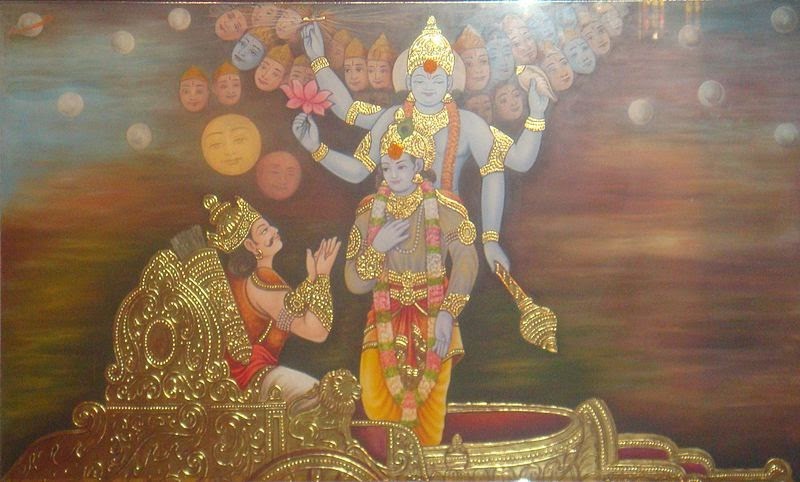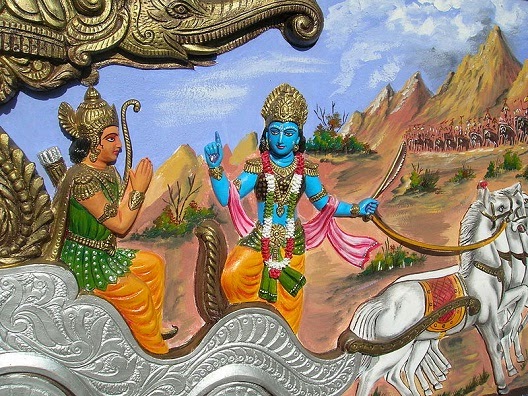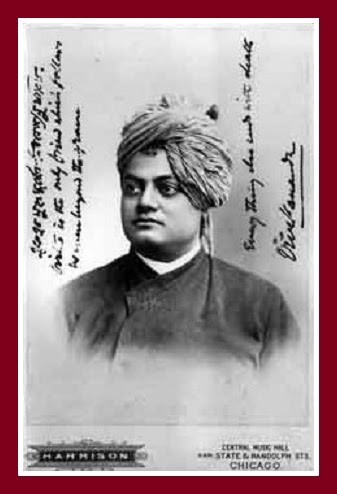Nishkam Karma or Nishkama Karma (Devanagari: निष्काम कर्म) is a prominent theme of Bhagavad Gita. It is also considered as the essence or the central message of Bhagavad Gita.
To elaborate this— Krisha suggests that we have rights only on the work or the action, and not on its results, whether it is good or bad. Our works, our desires should be "desireless", we should not desire for any pleasing (or unpleasing) result.
As I have already mentioned "Nishkama Karma" is the central message of Bhagavad Gita, readers will surely notice that are many verses in Bhagavad Gita discussin "Nishkam Karma" theme.
Nishkama Karma
The term is Nishkam Karma or निष्काम कर्म. First let's try to understand its meaning.- Nishkam/निष्काम is a sandhi of nih+kam or निः+काम. Here "nih" or "निः" means "without" and "kam/काम" means "kamna"/"कामना", i.e. any kind of desire.
- Karma/कर्म means "work"/"action", "kri/कृ " dhatu.
To elaborate this— Krisha suggests that we have rights only on the work or the action, and not on its results, whether it is good or bad. Our works, our desires should be "desireless", we should not desire for any pleasing (or unpleasing) result.
As I have already mentioned "Nishkama Karma" is the central message of Bhagavad Gita, readers will surely notice that are many verses in Bhagavad Gita discussin "Nishkam Karma" theme.
In this article our topic is Swami Vivekananda's quotes and comments on Bhagavad Gita's teaching "Nishkam Karma".
Swami Vivekananda on Nishkama Karma
Here you'll find Swami Vivekananda's mentions, quotes and commentaries on Bhagavad Gita's teaching "Nishkam Karma".What is Nishkama Karma?
- Now, what is the meaning of working without motive? Nowadays many understand it in the sense that one is to work in such a way that neither pleasure nor pain touches his mind. If this be its real meaning, then the animals might be said to work without motive. Some animals devour their own offspring, and they do not feel any pangs at all in doing so. Robbers ruin other people by robbing them of their possessions; but if they feel quite callous to pleasure or pain, then they also would be working without motive. If the meaning of it be such, then one who has a stony heart, the worst of criminals, might be considered to be working without motive. The walls have no feelings of pleasure or pain, neither has a stone, and it cannot be said that they are working without motive. In the above sense the doctrine is a potent instrument in the hands of the wicked. They would go on doing wicked deeds, and would pronounce themselves as working without a motive. If such be the significance of working without a motive, then a fearful doctrine has been put forth by the preaching of the Gita. Certainly this is not the meaning. Furthermore, if we look into the lives of those who were connected with the preaching of the Gita, we should find them living quite a different life. Arjuna killed Bhishma and Drona in battle, but withal, he sacrificed all his self-interest and desires and his lower self millions of times.[Source]
- The next is, Nishkâma Karma, or work without desire or attachment. People nowadays understand what is meant by this in various ways. Some say what is implied by being unattached is to become purposeless. If that were its real meaning, then heartless brutes and the walls would be the best exponents of the performance of Nishkama Karma. Many others, again, give the example of Janaka, and wish themselves to be equally recognised as past masters in the practice of Nishkama Karma! Janaka (lit. father) did not acquire that distinction by bringing forth children, but these people all want to be Janakas, with the sole qualification of being the fathers of a brood of children! No! The true Nishkama Karmi (performer of work without desire) is neither to be like a brute, nor to be inert, nor heartless. He is not Tâmasika but of pure Sattva. His heart is so full of love and sympathy that he can embrace the whole world with his love. The world at large cannot generally comprehend his all-embracing love and sympathy.[Source]
The result of every work is mixed with good and evil
The result of every work is mixed with good and evil. There is no good work that has not a touch of evil in it. Like smoke round the fire, some evil always clings to work. We should engage in such works as bring the largest amount of good and the smallest measure of evil. Arjuna killed Bhishma and Drona; if this had not been done Duryodhana could not have been conquered, the force of evil would have triumphed over the force of good, and thus a great calamity would have fallen on the country. The government of the country would have been usurped by a body of proud unrighteous kings, to the great misfortune of the people. Similarly, Shri Krishna killed Kamsa, Jarâsandha, and others who were tyrants, but not a single one of his deeds was done for himself. Every one of them was for the good of others. We are reading the Gita by candle-light, but numbers of insects are being burnt to death. Thus it is seen that some evil clings to work. Those who work without any consciousness of their lower ego are not affected with evil, for they work for the good of the world. To work without motive, to work unattached, brings the highest bliss and freedom. This secret of Karma-Yoga is taught by the Lord Shri Krishna in the Gita.
How to follow the ideal of Nishkama Karma
We say that we cannot do good without at the same time doing some evil, or do evil without doing some good. Knowing this, how can we work? There have, therefore, been sects in this world who have in an astoundingly preposterous way preached slow suicide as the only means to get out of the world, because if a man lives, he has to kill poor little animals and plants or do injury to something or some one. So according to them the only way out of the world is to die. The Jains have preached this doctrine as their highest ideal. This teaching seems to be very logical. But the true solution is found in the Gita. It is the theory of non-attachment, to be attached to nothing while doing our work of life. Know that you are separated entirely from the world, though you are in the world, and that whatever you may be doing in it, you are not doing that for your own sake. Any action that you do for yourself will bring its effect to bear upon you. If it is a good action, you will have to take the good effect, and if bad, you will have to take the bad effect; but any action that is not done for your own sake, whatever it be, will have no effect on you. There is to be found a very expressive sentence in our scriptures embodying this idea: "Even if he kill the whole universe (or be himself killed), he is neither the killer nor the killed, when he knows that he is not acting for himself at all." Therefore Karma-Yoga teaches, "Do not give up the world; live in the world, imbibe its influences as much as you can; but if it be for your own enjoyment's sake, work not at all."
More Vivekananda quotations on the theme Nishkama Karma
We recommend to read this article too—
This page was last updated on: 29 May 2014, 6:34 pm IST (UTC+5:30 hours)
Number of revisions in this page: 1






![It is all play. . . . [You may say,] "We have to do something; let us do good." [But] who cares for good and evil? Play! God Almighty plays. That is all.](https://blogger.googleusercontent.com/img/b/R29vZ2xl/AVvXsEihxNjo2_hf2rTVIT7ivcFMLLIt0GSeuMorCT4yjD7GokWVflqzzuRjtp1NmrCaFjHkQcw2du0klP8w-HsQ3Z5RqlwMxeWWe3VIiLvlbjs6Y4xwz6UhOR-c43EcCj_j7KsKV6lI7MVAcAIh/s1600/M+17.jpg)























-1891-2.jpg)